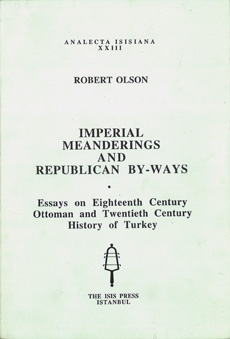|
PREFACE
I am delighted to present these twenty essays in the Isisiana Series. The seven articles in Part I deal with eighteenth century Ottoman topics. These essays are concerned particularly with the Tulip Period (Lille Devri), its consequences and the Ottoman-Iranian wars of the first half of the eighteenth century. Articles 1, 2 and 3 discuss aspects of the role of the Jews in the developments during this period, especially after the Patrona Halil rebellion in 1730. These three articles, along with article 1 in Part II which also deals with an aspect of Jewish-Young Turk relations, were attempts, at the time when I wrote them, to revise the then held views in the obtaining historiography.
The other four articles, nos. 4, 5, 6 and 7 are concerned primarily with the ideas of change, continuity, traditionalism, modernism, dependency, political economy, ’decline’ and attempts to periodize these ideas and theories with regard to the first half of the eighteenth century. I present these essays here as they, I like to think, presaged many of the same topics that
became so hotly debated from the 1970s to the 1990s.
All of the articles in Part II, with two exceptions, deal with Ottoman-Kurdish, Turkish-Kurdish and Kurdish history.
In order that the articles appear in terms of content as closely as possible to the originals there is some redundancy. I thought it best not to cull all extraneous materials so that the reader and researcher would have full access to all notes and appendices. For example, I have included Everard Fawkener's 1740 despatch to the Duke of Newcastle, the British Foreign Secretary, in both articles 2 and 3. On a few occasions I have had to insert a word or two to clarify my views. For example, in article 3 in Part II, I have indicated that I do not think that Sheikh Ubaydallah was a nationalist. I disagree with Wadie Jwaideh on this point.
Inevitably in articles, such as nos. 10-13, which deal with similar topics, there are redundancies that could not be eliminated without major rewriting entailing substantial expense. This would have defeated the purpose of presenting this collection of essays to a wider audience with the least possible cost.
Robert Olson
Introduction
Imperial meanderings is an apt title for the articles included in Part I. It was while I was a peace corps volunteer in Turkey in the early 1960s teaching in Salihli in the Gediz river valley just across the Bozdag mountain range from the Meander, now named Menderes, river valley that I first fell in love with the civilizations, history, cultures and languages of the peoples of Turkey and the Middle East. When I had a few days off or a vacation I loved to meander through, the Greek, Roman, Byzantine, Seljuk and Ottoman ruins as well as the still, existing buildings. In a one day excursion from Salihli I could reach Ephesus, Aphrodisias, Miletus, Didyma, Hierapolis, Pamukkale, Manisa and Alaşehir among many other places of interest. With a week's vacation I was able to reach Istanbul and see the mighty mosques of the Ottomans. Then, I was hooked for good. From that time onwards, my meanderings have never ceased.
In order to encompass the broadest possible swath of my interests I decided to pursue a graduate program in Ottoman studies. I was interested especially in the eighteenth century and the role the Arab provinces of the empire played in the Ottoman-Iranian wars of the second quarter of that century. When I commenced my graduate work in 1965, Ottoman studies was still dominated by imperial, political and administrative studies with a strong Eurocentric and Balkan bias. For that reason I determined to study Ottoman relations with Iran and the impact of those relations on the political economy of the empire. My intention was to study the periphery in order to define more accurately the center. The essays comprising Part I deal with these efforts.
Even though I commenced this research more than twenty-five years ago, I was delighted to learn upon reading Ariel Salzman's, "An Ancien Regime Revisited: 'Privatization' and Political Economy in the Eighteenth Century Ottoman Empire," (Politics & Society, vol. 21, no. 4 (1993), 393-424) excellent and award winning article in which she critiques much of the scholarly literature regarding different interpretations of eighteenth century Ottoman political economy over the past half century, that she credits my work as attempting "to sort out the parties and issues-taxes, credit, promotion to offices and malikane-involved in these events," i.e. the period from 1703 to 1768.1 still think, however, even after 25 years, that historians of the eighteenth century have given short shrift to the impact the Safavid and Afsharid empires had on the… |
